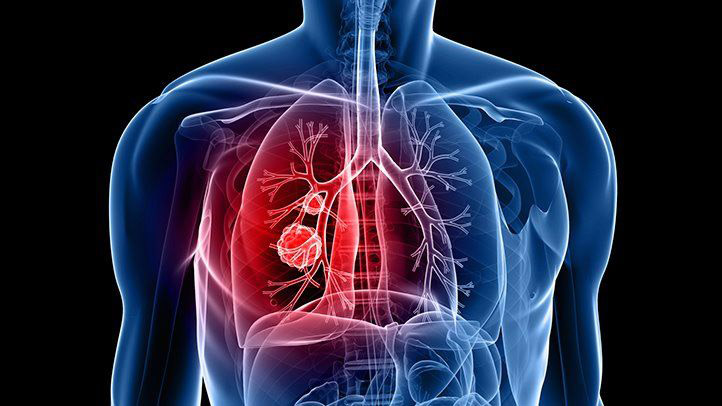
One Visit. One Team.
One Coordinated Plan for Lung Cancer Care.
The Lung Cancer Multidisciplinary Clinic at East Jefferson General Hospital brings together medical oncologists, thoracic surgeons, and radiation oncologists who work together to provide comprehensive, expert lung cancer treatment options in one visit so you get the answers and support you need, faster.
Having a multidisciplinary team of experts on your side means that all of your doctors are on the same page. This is especially beneficial when it comes to coordinating complex treatment protocols involving multiple therapies.
Book Your Appointment
Monday Morning Specialized Clinic
Location
Lung Cancer Multidisciplinary Clinic
4204 Houma Blvd., 2nd Floor
Metairie, LA 70006
Treatment & Services
Advanced Diagnostics
- Comprehensive Lung Cancer Workup
- Lung Nodule Program
- Low-Dose CT Lung Cancer Screening
- Endobronchial and Endoscopic Ultrasound
- Robotic Bronchoscopy
- Interventional Pulmonology
- Advanced Laboratory Techniques
Care Planning & Personalization
- Individualized Treatment Planning
- Testing for Molecular & Genetic Markers to Optimize Treatment Response
- Multidisciplinary Case Review
Therapies & Interventions
- Highly-Targeted Radiation Therapy
- Carefully Selected Systemic Therapy, including Chemotherapy
- Video-Assisted Thorascopic Surgery
- Robotic Surgery
- Access to Clinical Trials
Supportive & Follow-up Care
- Oncology Nurse Navigators
- Pulmonary Rehabilitation
- Palliative Care for Improved Quality of Life and Improved Survival
Your Care Team

Thoracic Medical Oncologist & Lung Cancer Specialist
Professor of Medicine
Edward G. Schlieder Chair in Medical Oncology
Chief, Section of Hematology & Medical Oncology
Director, Tulane Cancer Center
Tulane University School of Medicine
Co-Director of the Louisiana Cancer Research Center

Thoracic Medical Oncologist & Lung Cancer Specialist
Assistant Professor of Medicine: Hematology & Medical Oncology
Tulane University School of Medicine

Thoracic & Cardiac Surgeon
Assistant Professor of Medicine
Department of Surgery
Tulane University School of Medicine

Radiation Oncologist
Assistant Professor of Radiation Oncology
Hematology & Medical Oncology
Tulane University School of Medicine

Advanced Practice Provider & Specialty Care Liaison
Instructor of Clinical Medicine
Hematology & Medical Oncology
Tulane University School of Medicine
Additional Information
Lung cancer is a condition in which lung cells multiply uncontrollably to form growth (called tumors) that invade and destroy normal tissue. These malignant cells have the potential to migrate to other sites of the body causing metastasis and symptoms related to the invaded organ.
Lung cancer is the second most common cancer in men (after prostate cancer) and in women (after breast cancer), however is the number one in cancer mortality in the United States accounting for one third of all cancer-related deaths (150,000 each year) in men and women.
Risk Factors
The most important risk factor for lung cancer is tobacco smoking. Eighty-five percent of all lung cancer cases occur in active or former smokers; making smoking cessation the most crucial factor for preventing lung cancer. Additional risk factors include second hand smoking, environmental exposures such as asbestos and radiation, chronic obstructive pulmonary disease (COPD) and family history of lung cancer.
Symptoms
Lung cancer is usually asymptomatic until is in advanced stages. This is one reason why most of the cases are diagnosed late during the disease. Symptoms include cough (in some cases with blood), shortness of breath, chest pain, fatigue, loss of appetite, weight loss, headaches, confusion, and bone pain.
Diagnosis
A definitive diagnosis of lung cancer requires the presence of malignant cells in tissue biopsy or cytology. These specimens can be collected through diverse diagnostic procedures that include sputum cytology, bronchoscopy, thoracentesis, CT-guided lung biopsies or surgery.
Staging of lung cancer may include different imaging procedures involving the chest, abdominal and brain and include CTs, CT-PETs, and brain MRIs. In addition, more invasive procedures such as Endobronchial Ultrasound Bronchoscopy (EBUS), Endoscopic Ultrasound Endoscopy (EUS), or surgical procedures such as mediastinoscopy are employed to make the diagnosis of lung cancer. In some cases biopsies of possible metastatic sites may be required in order to stage the tumor, which is important for deciding upon the best treatment option.
Treatment
Treatment of lung cancer includes surgical resection for early stages if the patient is a good surgical candidate. Radiation therapy and chemotherapy are used for advance stages or for non-surgical candidates in early stages. An important advance in the treatment of lung cancer is the use of molecular markers in tissue samples that can identify patients who will respond better to specific chemotherapy agents.
Screening
Lung cancer screening with low dose CT has recently shown encouraging results; however there are potential risks with this approach that need to be discussed in detail with your treating physician.
At Tulane we are committed to provide the best care possible in lung cancer, which includes a fast diagnostic approach and accurate staging using state of the art technologies such as endobronchial (EBUS) and endoscopic ultrasound (EUS) techniques. Moreover, we use state-of-the-art molecular pathology techniques to detect EGFR mutations and ALK-fusion gene rearrangements, that identify patients who will respond to new potent treatments for lung cancer. Our pulmonary specialist are part of a multi-disciplinary team that also includes oncologists, radiation oncologists, pathologists, interventional radiologists and thoracic surgeons in order to provide the best treatment or palliation to every patient.
Lung Cancer Alliance
American Lung Association
American Thoracic Society
Lung Cancer Staging
Fiberoptic Bronchoscopy (ATS)
Lung Cancer Prevention
Advanced Lung Cancer (ACCP)
International Association For The Study Of Lung Cancer (IASLC)
IASLC Statement On CT Screening For Lung Cancer
Louisiana Smoking Cessation
The Louisiana Campaign For Tobacco-Free Living
Treat Mesothelioma
